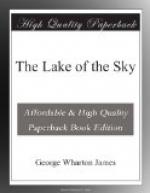Pomroy, who went to Carson,
returned 7 P.M. After supper,
again singing in chorus, and
then the glorious campfire.
CHAPTER E
JOHN VANCE CHENEY AT LAKE TAHOE
One of America’s poets who long lived in California, and then, after an honorable and useful sojourn as Director of one of the important libraries of the East, returned to spend the remainder of his days—John Vance Cheney—in 1882, made the trip to Lake Tahoe by stage from Truckee, and, among other fine pieces of description, wrote the following which appeared in Lippincott’s for August, 1883:
One more ascent has been made, one more turn rounded, and behold, from an open elevation, close upon its shore, Lake Tahoe in all its calm beauty bursts suddenly upon the sight. Nestled among the snowy summit-peaks of the Sierra Nevada, more than six thousand feet above sea-level, it lies in placid transparency. The surrounding heights are all the more pleasing to the eye because of their lingering winter-cover; and as we gaze upon the Lake, unruffled by the gentlest breeze, we marvel at the quiet,—almost supernatural,—radiancy of the scene. Lakes in other lands may present greater beauty of artificial setting,—beauty dependent largely upon picturesqueness, where vineyards and ivied ruins heighten the effect of natural environment,—but for nature pure and simple, for chaste beauty and native grandeur, one will hesitate before naming the rival of Lake Tahoe. This singularly impressive sheet of water, one of the highest in the world, gains an indescribable but easily-perceived charm by its remoteness, its high, serene, crystal isolation. Its lights and shades, its moods and passions, are changing, rapid, and free as the way of the wind.
A true child of nature, it varies ever, from hour to hour enchanting with new and strange fascination. The thousand voices of the lofty Sierra call to it, and it answers; all the colors of the rainbow gather upon it, receiving in their turn affectionate recognition. Man has meddled with it little more than with the sky; the primeval spell is upon it, the hush, the solitude of the old gods. The breath of powers invisible, awful, rouse it to the sublimity of untamable energy; again, hush it into deepest slumber. Night and day it is guarded, seemingly, by wonder-working forces known to man only through the uncertain medium of the imagination. The traveler who looks upon Lake Tahoe for a few hours only learns little of its rich variety. Like all things wild and shy, it must be approached slowly and with patience.
But our sketch must not include more than the hasty glimpses of a day. The stage conveyed us directly to the wharf, which we reached at ten o’clock, having accomplished our fourteen mile ride up the valley in about two and a half hours. As we boarded the little steamer awaiting




